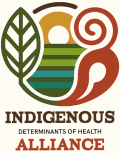Our Mission
Our mission is to advocate for and support implementation of culturally safe, rights-based health systems for Indigenous communities globally. We aim to elevate the Indigenous Determinants of Health framework, uphold data sovereignty, and foster systemic changes that support Indigenous Peoples to access equitable healthcare and exercise their inherent rights to health and well-being, in alignment with the United Nations Declaration on the Rights of Indigenous Peoples (UNDRIP).

Vision
To create a world where Indigenous Peoples lead the way in defining, shaping, and receiving holistic health services grounded in their cultural traditions, sovereignty, and inherent rights, promoting wellness and resilience across generations.
Structure
The Indigenous Determinants of Health Alliance (IDHA) is incorporated as a 501(c)(3) organization under the Government of the District of Columbia in the United States.
IDHA operates through two primary governing structures. The first is a Board of Directors (BoD) composed entirely of Indigenous members. This board is responsible for guiding the programmatic staff in the execution of the organization’s activities and projects.
The second structure is a Global Advisory Committee (GAC), which features regional structures and includes members from all seven United Nations Permanent Forum on Indigenous Issues (UNPFII) sociocultural regions. These regional members represent Indigenous communities across their respective regions. Membership to the GAC is granted through invitation and nomination by regional Indigenous communities.
To ensure alignment and communication, the Board of Directors holds quarterly meetings to update Global Advisory Committee members on IDHA’s ongoing initiatives and activities.
The Board and the GAC work together on the expansion of the IDHA framework, which was developed after the initial UNPFII Expert member study ‘Indigenous determinants of health in the 2030 Agenda’ for Sustainable Development’ (E/C.19/2023/5). It was expanded through two further UNPFII-sponsored studies on IDH Operationalization (E/C.19/2024/5), and IDH Evaluation (E/C.19/2025/5).
